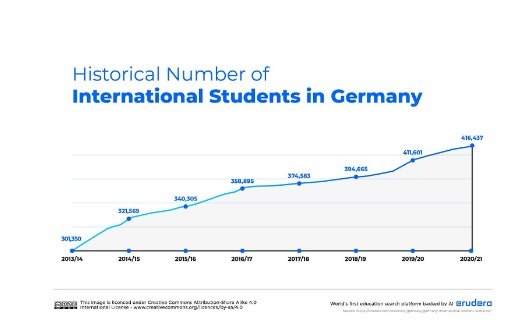
The Complete Guide to Free Education in Germany.
Germany is a popular destination for international students who want to pursue higher education without breaking the bank. In this blog post, we will explore how you can get free education in Germany and what are the benefits of doing so. Education has become a business more than a necessity. Most private educational institutions charge huge fees in return for the courses they offer.
Do you know that there is a country that has kept the essence of education? It is Germany that has demolished this system, and most educational institutions charge NO tuition fees! The 1971 card afforded Germany’s social democratic or another moniker to make certain of the abolition of tuition fees, instituting a state-funded financial aid system.By 1976, it was sealed legally in legislation that set stopping of fees in higher institutions. In due time, following a series of educational reforms over numerous years, the last fortress, Lower Saxony, finally canceled its tuition fees in 2015.
As a consequence, the introduction of this policy enables students from both domestic and international locations to pursue their undergraduate studies in Germany, paying only for ‘essentials’ that are spread over each semester.The German free education policy is built on the foundation of understanding and acceptance that every citizen or resident has a right to free education as one of their basic rights. Second, it guarantees that Germany is built on a structured workforce concerning the varying levels of the industrialized knowledge-dependent economy.
Moreover, it attracts international students, enabling cultural pluralism, human tolerance, and interchange. Which is the global view that adds value to the world we live in today.

Following is a table that shows how much money you need if you want to enroll in a German university and stay there.
Item | Average cost per month |
Rent and utilities | 350 to 500 € |
Food and drink | 200 to 250 € |
Health insurance | 100 € |
Phone and internet | 30 € |
Leisure and hobbies | 50 to 100 € |
How To Qualify For Free Admissions in Germany: Requirements and Tips
However, in Germany, studying tuition-free is available to all the citizens of other countries without discrimination against nationality. Germany, being non-tuition, is as open to German nationals from other European countries or any non-European nation. Except for a research-based Ph. D degree, this benefit applies to almost all study programs at public universities.
Also, to be eligible to apply for a German university program, the following documents should be obtained by you. You must follow the given steps:
- Choose a program
- Also, make sure that you meet the entry requirements to study at the university of your choice
- You should collect the required documents, any of them that you can submit
- Arrange your finances, make all financials are in their right places
- If you do not have an insurance policy, please sign up for one; otherwise, check your current health insurance.
- Apply for a visa
Nationalities That Can Apply For The German Student Visa
- Applicants within the European Union (including Norway, Switzerland, Iceland, and Liechtenstein): However, if you are an EU applicant (i.e., from Norway, Switzerland, Iceland, or Liechtenstein) coming to Germany to study, there is no need for your German student visa because it will be issued when you arrive in Germany and inform the authorities at any entry point that is why within this group a fee applies per application or Per person only euro
- Applicants from the US, Canada, Australia, New Zealand, Israel, Japan, and South Korea: For any of these countries’ citizens, a visa does not present your need to study in Germany. On the flip side, only two weeks after arrival, you will have to register in your Residents’ Registration Office and the Aliens’ Registration Office (Ausländeramt) while obtaining a residence permit (Aufenthaltserlaubnis).
- Applicants from Andorra, Brazil, El Salvador, Honduras, Monaco, San Marino, or Taiwan: The list of countries mentioned above would only require you to apply for a German student visa if you intend to work before, after, or even during completion. In this situation, one should apply for a visa in their country through the local embassy or consulates of Germans and make it a point to make your way down there much earlier here for you to ask. Both visa holders and non-visa holders will also have to apply for a residential permit within two weeks of arriving. Taiwanese students should have a passport where they have to write their identity card number.
- Applicants from the rest of the world: The same applies to students who are from any other country that is not mentioned above, and in this case, you will necessarily need a German student visa. You can apply for this in your country’s local German embassy/consulate. The usual cost, if you review the costs for a visa, is €60.
Basic Requirements
- Proof of acceptance from a German university
- Sufficient financial resources (blocked account, scholarship, etc.)
- Health insurance
- Proof of accommodation
- Valid passport
- Previous academic records and language proficiency certificates (if applicable)
Universities That Offer Free Education In Germany
Almost 300 universities in Germany do the good deed of training amazing-minded students in 1000 + courses. However, some private universities charge some tuition fees. For example, the state of Baden-Württemberg has allowed public universities to impose tuition fees on non-EU/EEA students since 2017.
- University of Cologne – One of the earliest foundations was built in the city of Cologne, Germany, by the University of Cologne, which was established formally back in 1388. As a major regional research university and one of Germany’s top universities, it is highly reputed for quality education.This was the sixth ancient Central Europe university. It was closed in 1798, but it reopened after a century and a half – restored to ensure that the memory of their noble endeavors towards education will never die out.
- Ludwig-Maximilians-Universitat Munchen – The school is held in Ludwig-Maximilians-Universitat Munchen, a city in Germany. LMU boasts a long history that stretches back to its establishment in 1472 and has spread worldwide since then as it has ranked among the best academic and research institutions in Europe.Throughout its time, it has become a destination for resplendent scholars and talented students from different parts of the world. This diverse and dynamic community guarantees that LMU stays ahead of the in-training innovational minds in the continually progressive world.
Goethe University Frankfurt – Goethe University Frankfurt, one of the best educational establishments and a member of world-leading research universities, offers a wide variety of programs. What it boasts is that it is devoted to developing a multi-disciplinary perspective in overcoming complex problems in many ways honored after the legendary Goethe- a Frankfurt polymath for his genuinely noble lit science and philosophy contributions still holds tightly visited bis achievement ideals as one of the world’s best universities.
RWTH Aachen University – Created in 1870 by the Aachen Act, RWTH Aachen University is a prestigious German public university located in Aahren, North Rhine-Westphalia, Germany. Known also as the Rhine-Westphalia Technical University of Aachen, or shortened to TU Aachen and further on referred to in such forms AACTH– RWH/AACH; UA or Rheinisch-Westfälische Technische Hochschule Aachen, it has managed for itself an appreciation through these names.
University of Münster – A renowned public research university based in Münster, North Rhine-Westphalia, Germany, the University of Münster is a well-recognized institution that imparts knowledge. With over 43,000 students who are studying from more than 120 programs available in fifteen departments and taking the title of Germany’s fifth largest university, it is also recognized as — ?.Additionally, the University of Münster constitutes a leading focal point of German intellectual life, which does not fail to contribute a notable amount to building the country’s scholarly and research efforts.
Conclusion
With your open mind, assimilating a new language, and hereafter getting lost in the fast-paced cities and tranquil communities of Germany as you immerse yourself in its glorious past and vibrant culture, you will be gifted with cultural gems made available by this country. a wide range of topography, with towering mountains covered in majestic snow and charming lakes ideal for exploring the calmness.
Frequently Asked Questions (FAQ)
It may or may not be true, depending on the university. Many undergraduate programs use German as a teaching medium. So, you are required to submit proof that you know German. But, for Masters and Doctorate programs, there are English medium facilities for teaching. However, IELTS and TOEFL are required to show how trained you are in English.
It is different for different countries from where you are applying. Also, it depends on what time of the year it is. It is best to be safe and apply at least three months before the date you are going to Germany.
There is an enrollment fee for confirmation purposes. It is usually 250 € approximately per semester. Also, if you are applying for transport from your stay to the institution, then an optional semester ticket fee is needed. Also, if the time for which you are staying in Germany to study is more than the course time of 4 years, an extra fee of 500 € is needed.
